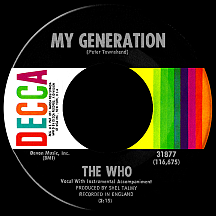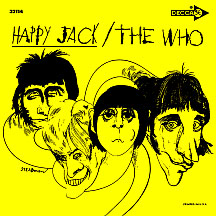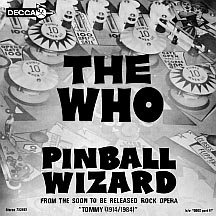THE WHO
If there is any one music act that can be given credit for instigating the swagger, onstage unruliness and renegade image of the modern day rock band, The Who must be held accountable. After all, how many guitar-smashers can you name that predate them? Who else can be blamed for causing thousands of dollars' worth of damage to various hotel suites on a regular basis prior to 1964? There may have been a few, but it was Pete and Roger, John (to a lesser degree) and Keith (to a greater degree) who made self-indulgent, in-your-face behavior fashionable...more than half a century ago! It's a wonder they weren't sequestered somewhere secure so as not to provoke further corruption among an already recalcitrant throng of worldwide musicians! But these four were so very good at making music; innovative, entertaining and always unpredictable.
The ever-changing early Whosters began around 1959 when teenage Londoners Peter Townshend (amateur banjo boy) and John Entwistle (french horn enthusiast) started a traditional jazz group called The Confederates while attending Acton Grammar School with future bandmember Roger Daltrey. By '61, Roger was playing guitar with skiffle shufflers The Detours, replacing Colin Dawson at some point as lead singer. Meanwhile, troublemaking Wembley youth Keith Moon was already banging away at the drums with groups like The Escorts, Mark Twain and the Strangers and The Beachcombers. In the early months of 1964, Pete, John and Keith joined Rog in the Detours lineup, then changed the band's name to the Who, a bizarre choice during a time when nearly every group's name ended with an "s."
The band's manager, Peter Meaden, suggested they focus on attracting the "Mod" crowd (those self-proclaimed modernists and style-conscious nightclub regulars as opposed to rougher rival "Rockers," the cycling rock and roll fans somewhat more prone to insubordination). He changed their name to The High Numbers, an artsy moniker the guys didn't care for, but he also got them on the telly (an August '64 installment of The Beat Room on the BBC) and in the door at Philips Records. A single on Fontana resulted, both sides reworkings of top-tier American R&B recordings; "Zoot Suit" used the exact same tune and nearly identical arrangement as "Misery," the great 1963 hit by The Dynamics, while "I'm the Face" similarly aped Slim Harpo's "I Got Love If You Want It," each with an entirely new set of lyrics. Meaden cavalierly claimed sole writer credit for both tracks, disregarding any measure of fairness to the original creators.
Pete had a bad day right around that time and destroyed his first guitar onstage; Keith followed his example soon afterwards and began smashing his drum sets. By year's end they reclaimed the Who name and moved in a new direction. American musician and producer Shel Talmy (who'd moved to England and helmed some hits for The Bachelors) saw them perform and immediately rolled up his sleeves, setting to the task of producing Who records destined to become classics. Townshend's "I Can't Explain" (on Brunswick at home and Decca in the U.S.) was a whopper of a second-chance debut Who single, a smokin' two-minute blast of ambivalent romantic emotions with Roger's lead vocals backed by The Ivy League (the Birmingham-based trio and soon-to-be "Funny How Love Can Be" hitmakers). Mod fans were already in the know; mucho offshore Pirate play forced disbelievers to pay attention and it worked like a charm...a U.K. top ten hit right off the bat (in the U.S. it was a minor hit, an acceptable start). Flip side "Bald Headed Woman" ('...gonna make me mean!'), a traditional blues and folk song (Talmy treated himself to the writer credit this time), features later Yardbirds and Led Zeppelin guitarist Jimmy Page.
"Anyway Anyhow Anywhere," a riff-heavy Townshend-Daltrey tune, celebrated freedom of choice (a creative option the band would soon exercise with little regard to record company-imposed protocols) and made them two-for-two in the British top ten. Early Who goodies were scattered around on various singles and albums; the U.K. B side, "Daddy Rolling Stone," took a no-nonsense approach to Derek Martin's year-old arrangement of Otis Blackwell's decade-old R&B original. U.S. flip "Anytime You Want Me" is a Garnet Mimms ballad (cowritten by Mimms and Jerry Ragovoy) delivered more softly than the original, an unusual move for the fierce foursome.
The corker came next (yes, I'm saying they pulled out all the stops): "My Generation," their first number one hit...? Well, okay, it stalled at number two in November '65 behind The Seekers' lovely but hardly forward-thinking "The Carnival is Over." In the States, this milestone Who single bafflingly charted much lower - we just weren't ready for so much feedback/distortion, I guess! Daltrey's stuttering delivery is said to represent perpetually drugged-out mods, though interpretations have run the gamut from an immature teen demanding his heretofore unearned right to act as he thinks adults should, to a death wish in the lyric '...hope I die before I get old'...a rock-posturing statement best considered more seriously. The track is exciting, just the kind of thing to up the ante and change the game in the music biz, which many agree it did. The stateside flip, Pete's intriguingly ambiguous "Out in the Street," trumped the British coupling, a remake of James Brown's "Shout and Shimmy," itself a retread of The Isley Brothers' trendsetting 1959 hit "Shout."
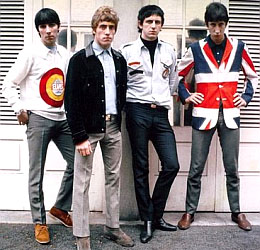
Finally, an album...a year and a half after initial impact! My Generation contained hit-worthy LP-only tracks; my top choice would be "Much Too Much," an ode to love that's '...too heavy on me!' While the lyrics of "My Generation" are relatively simple (brilliantly so, as it was just enough to make the point), "Substitute" has lyrics coming from several directions ('...I look pretty tall but my heels are high...look pretty young but I'm just back-dated...my fine looking suit's really made out of sack...the north side of my town faced east and the east was facing south...')...what? I mean...Who!!! Great song! Another top ten in the Who's homeland, on the Reaction label in April 1966, it was unfortunately a no-go in the U.S., where it came out on Atco. The B side in both lands, "Waltz for a Pig," is one of many heavy-handed, big production instrumentals (another, "The Ox," closed the album and wound up on a single shortly afterwards).
Townshend had largely taken control of studio production by this time. Talmy didn't seem to have a problem being pushed away (he still received credit), as he was having success with The Kinks. The Who addressed romantic separation with "A Legal Matter" (standout line: '...I've freed my head from your garden rails'), issued by Brunswick at the same time as "Substitute," which may account for its barely-top 40 peak in England. "The Kids Are Alright" (Pete trusted his buds with his bird!) appeared that summer (like "Legal" it was a My Generation LP track) and was later the title of a 1979 film about the band.
The next few singles, according to Townshend, were "sweet songs sung by a violent group." So...they were more in touch with their sensitive sides than public antics would suggest! Nevertheless, strong messages are evident: "I'm a Boy" ('...but my ma won't admit it!') smacked of poor parenting and, likely, Pete's own later-revealed sexual complexities (the song became their second number two hit, the closest they ever came to the top of the charts in Britain or America). Flip "In the City," a goodtime Moon-Entwistle tune, covered surfing, cars and fun in the sun, a faraway image of Cali that fascinated the band; they also released a version of Ronny and the Daytonas' 1964 hit "Bucket 'T'" complete with french horns and a lead vocal by Keith. "La-La-La-Lies" came next, a U.K.-only 45 that missed the charts altogether.
A Quick One raised the bar, and the bizarreness, a bit. The album featured the Who's American top 40 breakthrough; "Happy Jack" reveals a scenario of a simple man undeterred by cruel childish pranks played on him...if there's more to it than that, let me know and I hope it doesn't ruin the song for me. Keith, clearly ahead of his rivals in rock percussion, delivered one of his finest performances on the record. Brit B side "I've Been Away" is a prison release/revenge tale from the dark recessions of Mr. Entwistle's mind. The joy/curse of drinking heavily with an imaginary friend, "Whiskey Man," made for a disturbingly whimsical U.S. B side. "So Sad About Us" is a very mainstream, heartbreaking Quick One track that could have been a hit single. Other Quick ditties are wonderfully weird; "Boris the Spider" forces listeners to face the fear of 'creepy-creepy, crawly-crawly' creatures, magnified by author Johnny E.'s growly, scary vocals, then culminates in a '...sticky end' for the eight-legged protagonist; the song lives on as a horrorific Halloween favorite. "Cobwebs and Strange" is flat-out fun...that is, to everyone but "Moon the Loon," who surely had to ice his arms after the wild drumming imposed by a tempo that doubled, quadrupled and octupled as the wacky instrumental tune progressed.
In the summer of 1967, "Pictures of Lily" became just the fourth single to make a landing on the top 100 of the American charts while twice that many had achieved much stronger British sales rankings. The song's description of an adolsescent boy's fantasy girl was considered offensive in some circles; an oddly effective use of Entwistle's childhood instrument, the forceful, far-off-sounding french horn, was a trick that would later be used to acceptable excess as the group's music took on operatic proportions. Speaking of odd, the next Who single coupled two Rolling Stones songs, "The Last Time" and "Under My Thumb," their way of supporting Mick Jagger and Keith Richards, who were both doing jail time (well, a day or so, anyway) on charges of drug possession.
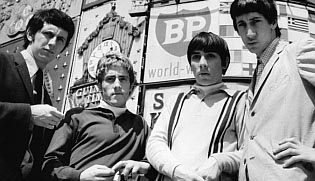
"I Can See For Miles" ('...'cause there's magic in my eyes') was, in Townshend's opinion, the Who's masterpiece, certain to finally give the band that elusive number one hit. When it barely scratched the top ten, Pete made his disappointment public, saying, "I spat on the British record buyer." Perhaps he was a bit oversensitive; after all, it was a top ten hit...on both sides of the Atlantic! As part of The Who Sell Out, it worked in a larger context. The album's "blatant commercialism" theme is fascinating with its unpaid, satirical Who-style commercial plugs ("Heinz Baked Beans," "Odorono") and Pirate Radio jingles, in addition to gloriously romantic songs ("I Can't Reach You," "Our Love Was, Is"), the epic "Rael" (again hinting at operatic things-to-come) and "Tattoo" ('I'm a man now, thanks to you...you'll be there when I die'), about an irreversible decision made simultaneously by two brothers.
The band chalked up a third top 40 U.S. hit (that's right, only three in as many years) with the abstractly braggadocio "Call Me Lightning." The U.S. flip revisited Entwistle's horror obsession; "Dr. Jekyll and Mr. Hyde" generates an uneasy feeling consistent with Robert Louis Stevenson's 1886 dual-personality character. The U.K. "Lightning" 45 arrived with Pete's "Dogs" as the A side; a pleasant little song about love and dog-track gambling, it goes off the rails a bit with Johnny's scratchy-voiced spoken interlude (a later flip side, "Dogs Part Two," is an unrelated instrumental rocker with barking sounds). "Magic Bus" ('too much!'), the band's biggest single of '68, sounds more psychedelic than earlier Whosongs; simply put, it's about buying a bus to '...drive my baby...' around in. The flip of the Decca 45, "Someone's Coming," took an interesting detour with a brass arrangement recorded at Bradley's Barn in Nashville (the notorious studio owned by Owen Bradley), home of many a Patsy Cline recording session...as well as a few hundred other country music superstars.
Once they'd proven they 'could see' for miles (or kilometers throughout most of Europe), they reversed focus with a song about '...that deaf, dumb and blind kid': "Pinball Wizard" ventured where no one else could imagine going. The expansion of the story became Tommy, a spring '69 double album touted as a "Rock Opera," a relatively fresh concept trailblazed by others but popularized by the Who's top-selling and highly-publicized recording (they even performed it, in its entirety, at opera houses). As the 1970s got under way, more hits ("I'm Free," "See Me, Feel Me") emerged from the ambitious 75-minute album.
Many rock acts were unable to transition successfully into the new decade (as if there were some stigma attached to the 1970 New Year), resulting in a changing-of-the-guard for rock music at that point in time. The Who moved forward unaffected, more popular than ever. In 1971, Who's Next (and its monster rock single "Won't Get Fooled Again") solidified their supremacy; suddenly the mostly-just-an-act hotel trashing and guitar smashing was more in line with the behavior of a whole generation of "bad boy" rockers, something it seemed everyone wanted to be. But the lifestyle came with a price: in September 1978, 32-year-old Keith Moon succumbed to a lethal combination of pills and alcohol. His death didn't deter the band. John Entwistle, Roger Daltrey and Pete Townshend carried on with former Small Faces drummer Kenney Jones (while admitting no one could ever truly take Keith's place) and The Who made great music for many moons to come.
NOTABLE SINGLES:
- Zoot Suit - 1964
as the High Numbers / - I'm the Face - 1964
as the High Numbers - I Can't Explain /
Bald Headed Woman - 1965 - Anyway Anyhow Anywhere /
Anytime You Want Me - 1965 - My Generation /
Out in the Street - 1965 - Subsitute /
Waltz For a Pig - 1966 - The Kids Are Alright /
A Legal Matter - 1966 - I'm a Boy /
In the City - 1966 - Happy Jack /
Whiskey Man - 1967 - Pictures of Lily /
Doctor, Doctor - 1967 - I Can See For Miles /
Mary-Anne With the Shaky Hands - 1967 - Call Me Lightning /
Dr. Jekyll and Mr. Hyde - 1968 - Magic Bus /
Someone's Coming - 1968 - Pinball Wizard /
Dogs Part Two - 1969 - I'm Free /
We're Not Gonna Take It - 1969 - The Seeker - 1970
- Summertime Blues - 1970
- See Me, Feel Me /
Overture from Tommy - 1970 - Won't Get Fooled Again - 1971
- Behind Blue Eyes - 1971
- Join Together - 1972
- The Relay - 1972
- Squeeze Box - 1976
- Who Are You - 1978
- You Better You Bet - 1981
- Athena - 1982


